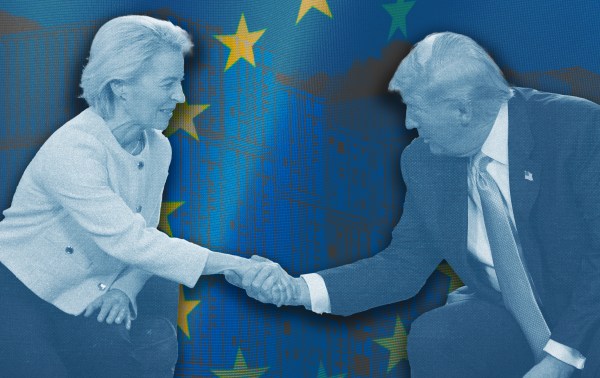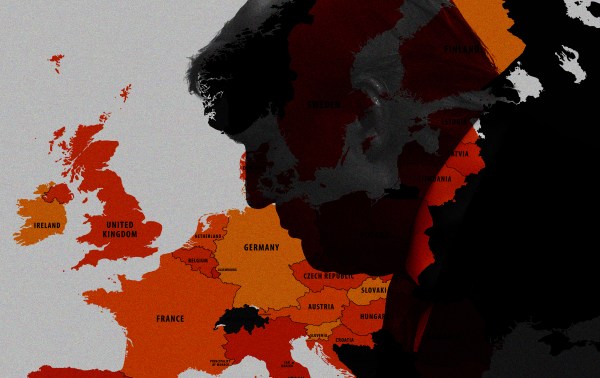Turn any article into a podcast. Upgrade now to start listening.
Premium Members can share articles with friends & family to bypass the paywall.
September has been a month of dramatic unrest in France, even by the standards of its protest-happy political culture. Prime Minister François Bayrou was ousted by a vote of no confidence in the French legislature on September 8, and last week hundreds of thousands of citizens participated in protests and strikes. French President Emmanuel Macron has so far resisted calls for a snap election. If he were to call for one, it would be the second such election in just 15 months.
The turmoil stems from a series of austerity and entitlement reforms that Macron has passed—or attempted to. After massive protests in 2023, Macron was able to pass a gradual increase of the retirement age from 62 to 64 for those in non-physically demanding professions, and an increase of the contribution period needed to receive a full pension from 42 to 43 years. These changes were hard-fought, and when Bayrou proposed additional changes—including limiting public sector pension increases and tightening the rules around the supplemental pension system for private sector workers, amid other austerity measures, the ensuing political chaos ended in the no-confidence vote against Bayrou, who was Macron’s sixth prime minister since he became president in 2017. The challenge of passing a new budget has fallen to new Prime Minister Sébastien Lecornu.
Much like the United States, France is suffering from ballooning costs stemming from an elderly population that its entitlement programs were never designed to accommodate, as well as a high budget deficit. But the dollar is the world’s primary reserve currency. American debt is routinely bought by foreign entities, creating an artificial source of lendable funds for the U.S. Treasury and lowering the rates it pays on government debt. That’s a cushion that France cannot rely on, and so it is now rapidly reaching the limit where the debt is becoming unsustainable.
France’s debt-to-GDP ratio stands at 114 percent, with a budget deficit equal to 5.8 percent of GDP. (The U.S. equivalent stands at 124 and 6.3 percent, respectively.) The goal of the austerity budget and entitlement reforms was to bring this deficit down to a more moderate 3 percent. Other proposed reforms included scrapping two public holidays, freezing social benefits and tax brackets at 2025 levels, and broad spending cuts across most areas, especially affecting subsidies for housing and elderly accommodations.
While it seems logical that entitlement reform inevitably leads to political upheaval, the experience from other countries suggests otherwise. Sweden is one among several countries to successfully reform entitlements during the 1990s. Canada introduced similar reforms around the same time, and the Netherlands followed as late as 2023.
France, of course, has a political culture in which riots, protests, and strikes are rather commonplace. Yet, the current situation is unusual: No government lost a vote of no confidence between 1962 and 2024. Now, two have lost such votes in less than a year, and over the same issue.
Why?
First, austerity has a bad rap in Europe. Since the 2008 financial crisis, a gap has opened in GDP per capita between the U.S. and Europe, with an even wider disparity between the U.S. and Western Europe specifically. While Eastern European countries like Poland and the Baltic states have continued to grow, major European economies like Germany, the United Kingdom, and France never recovered to pre-crisis trajectories.
The reasons why Europe has fallen behind are numerous: Much global economic growth since 2010 has come in the tech sector, in which Europe has lagged behind the U.S. since at least the 1970s. Its labor markets have more unionization and higher starting wages, which means it takes longer to rebalance and recover from recessions. And structural flaws that were exposed by the crisis—such as a one-size-fits-all monetary policy that may be wholly unsuitable for certain member states—also eroded long-term confidence and, subsequently, growth.
“Austerity was sold under a ‘no pain, no gain’ slogan. Europeans accepted the pain, yet are still waiting for the gains. This makes austerity an even tougher sell this time around.”
But European voters almost singularly blame austerity: While the United States under President Barack Obama pursued economic stimulus to spend itself out of the financial crisis, they argue, the EU inflicted austerity on its struggling member states, and this is why growth recovered in the former but has remained sluggish in the latter.
This narrative has its flaws: If austerity is to blame for Europe’s slow growth, why has Ireland grown faster than any other country in Western Europe over the past 10 years? Ireland famously received a bailout from the EU that effectively placed it under conservatorship for several years, with the “troika”—made up of the European Central Bank, the International Monetary Fund, and the European Commission—forcing a fiscal crash diet on the struggling Irish.
If austerity were detrimental to long-term growth, one would expect the countries that had the most austerity—such as Ireland—to be the poster children of Europe’s stagnation. That is not the case. And on the other hand, Germany barely had to tighten its belt during the crisis years, and yet its economy has stagnated in the years since.
For France, however, there truly is no option besides austerity: Its credit rating has already been downgraded once, with future downgrades very likely unless the political chaos is soon resolved. That has left bond yields at highs not seen since 2011, which in turn means that borrowing large amounts of money to use as stimulus is simply not an option.
Neither is taxing the rich, something France already does. France has a wealth tax, which, due to capital flight, already yields little to no net revenue. The austerity budget contained several tax increases for high-income households and corporations, likely included in a failed attempt to appease the left and the unions.
Unfortunately, despite this reality, most voters have made up their minds: Austerity was sold under a “no pain, no gain” slogan. Europeans accepted the pain, yet are still waiting for the gains. This makes austerity an even tougher sell this time around; never mind austerity that directly impacts those who have done nothing wrong except grow old.
Speaking of growing old, demographics are another reason for the U.S./EU growth gap: Europe’s population has aged more rapidly than the United States’. This brings us to the second reason why entitlement reform is even harder to sell now than it was in decades past.
Immigration was supposed to prevent this. As contentious a topic as immigration is in the United States, America is a nation of immigrants. On the other side of the Atlantic, many European countries, including France, have little experience with large-scale immigration, especially from outside their neighboring countries.
Pro-immigration politicians have argued that immigration is necessary to maintain the welfare states that Western European countries are so known for. Who is supposed to pay for tomorrow’s retirement benefits, if there is no inflow? And who is supposed to staff the nursing homes? Few in the native population find care work to be appealing.
In retrospect, it is clear that policymakers oversold immigration as a magic pill for Europe’s woes. Policymakers also, by and large, failed to distinguish between humanitarian migration, such as asylum seekers from the Middle East and North Africa, and skilled-worker immigration targeted at occupations with shortages. While the latter can have a strongly positive effect on the economy and, by extension, the welfare state, the former typically does not. But asylum-related migration was sold to reluctant voters as a cure-all for heavily burdened entitlement systems. Policymakers also significantly underestimated how difficult it would be to assimilate large groups of culturally distant migrants.
And so it is unsurprising that voters, in France and elsewhere, now feel a sense of betrayal as they are being told that they must accept the kind of welfare cuts that the past decades of high immigration, which they reluctantly accepted, were supposed to prevent.
Finally, the end of “two-bloc” politics has made reforms difficult. The two-party system that characterizes U.S. politics is uncommon in Europe, but almost all countries have blocs of parties that cooperate and form coalitions. Thus, while there may be as many as eight or 10 parties represented in a legislature, there are still only two serious candidates for prime minister or president.
Successful entitlement reforms have been characterized by broad agreements, with at least the largest left-wing and largest right-wing party coming together. This is what happened in Sweden during the 1990s, when the Social Democrats agreed to partial privatization to save the rest of the welfare state and help bring public finances back from the brink.
Now, in France as well as in the United Kingdom, the dual blocs are a thing of the past. With the rise of Marine Le Pen’s National Rally, and Nigel Farage’s Reform UK, there is a third bloc, one that is right-populist and anti-immigration.
This complicates negotiations not just for the obvious reason that it’s harder for three parties to agree on something than it is for two: The third bloc in France is built on opposition to both the other blocs. Even if National Rally were to agree that entitlement reforms and austerity are needed, sitting down with the “establishment” would risk their political street cred.
The threat of this bloc makes it harder, if not impossible, for the mainstream left to agree to spending cuts. Doing so would inevitably push even more working-class voters and retirees (a high-turnout group) into the arms of the populists.
Still, there are many things Emmanuel Macron could have done differently.
Most importantly, his timing is terrible. The pandemic presented an opportunity to push through entitlement reforms and other long-term measures to stem spending growth, one that—to my knowledge—no government took. Macron could have honestly argued that future spending cuts and new restrictions on entitlements were needed to pay for the pandemic relief measures. By waiting until interest rates are already rising, and by giving the populists another five years to continue growing, Macron made an already difficult fight even more so.
To stem the growth of parties like National Rally, Macron should hold a binding referendum on immigration laws and quotas. This is an idea Macron himself has floated but never realized. By holding a referendum, whatever the outcome, the issue of immigration would be politically neutralized, as all parties would be bound by the outcome. While National Rally would still be around after a referendum, having its main issue settled by a vote would have a seriously negative impact on the party.
These mistakes aside, Macron should be commended for trying to fix his country’s problems. His struggle to reform France’s entitlement system underscores a broader challenge facing Europe: balancing fiscal responsibility with political stability in an era of populist resurgence and demographic decline. Without broader consensus or a bold rethinking of how to restore public trust, France risks further unrest, leaving its leaders to navigate an increasingly precarious path toward sustainability.






Please note that we at The Dispatch hold ourselves, our work, and our commenters to a higher standard than other places on the internet. We welcome comments that foster genuine debate or discussion—including comments critical of us or our work—but responses that include ad hominem attacks on fellow Dispatch members or are intended to stoke fear and anger may be moderated.
With your membership, you only have the ability to comment on The Morning Dispatch articles. Consider upgrading to join the conversation everywhere.